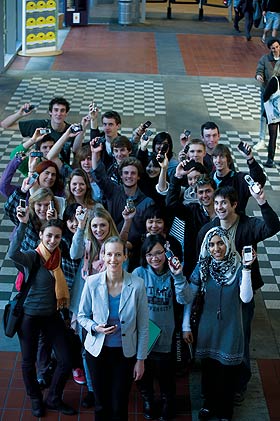
 Dr Tamlin Conner:
Dr Tamlin Conner:
I am interested in the factors – psychological, cognitive and genetic – that predict individual differences in happiness and other emotional states."
How much of our mood is hard-wired and how much is because you are simply having a bad day?
It's a question researchers like Dr Tamlin Conner (Department of Psychology) are pondering as they look to understand the role genes play in how we feel. She has harnessed modern mobile communication to carry out real-time tracking of a group of University of Otago students, using text messaging to get an instant picture of what their mood is at any time of the day, right through the week.
Such studies are just one facet of the research being carried out through the Daily Experiences Lab established by Conner in 2008 at the Department of Psychology.
"I am interested in the factors – psychological, cognitive and genetic – that predict individual differences in happiness and other emotional states."
Doing that successfully requires finding the best ways to measure emotions and happiness, as well as understanding why people's recalled emotions are often different to what they reported experiencing at the time.
Rather than using traditional assessments – asking how people felt over the past weeks or months – Conner has people report their emotions during their everyday life using text-messaging or the internet.
"I am skeptical of using retrospective reports of emotions as a window in to people's emotional well-being – memories are filtered and reflect beliefs about how things were."
For example, students in the real-time tracking study responded to texts on their mobile phones up to six times a day, over two weeks, questioning them about their happiness. "This approach shows a very dynamic profile that you can never get using a single time-point. You can see people's emotions as they cycle up and down – you can see that individual variability."
 Conner was amazed by the response rate amongst the students she was working with. "We had some people who were able to respond to 100 per cent of the texts. The average response rate was 95 per cent, which was better than any study like this I have done in my 10 years of doing these studies."
Conner was amazed by the response rate amongst the students she was working with. "We had some people who were able to respond to 100 per cent of the texts. The average response rate was 95 per cent, which was better than any study like this I have done in my 10 years of doing these studies."
She now plans to use these methods to look at the interplay between genetic factors and happiness, broadening her previous investigations of negative emotions such as anxiety. (This work will be supported in 2011 by a University of Otago Research Grant titled "The Genetics of Happiness".)
"These techniques are critical to advancing our understanding of genes and subjective emotional experience.
"Importantly, we find stronger genetic patterns in the real-time reports of emotion than in the retrospective reports. I think this is because certain genes influence our immediate emotional experience, which is best captured in the moment." Hard-wired for happiness?
Funding
University of Otago Research Grants